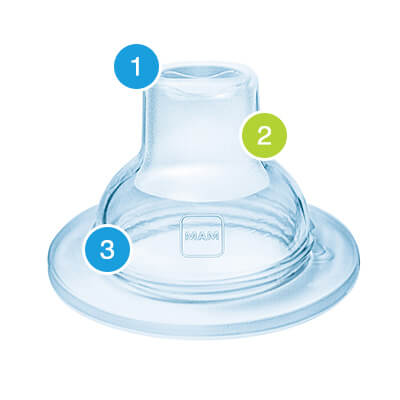2 extra weiche Trinkschnabel – für Babyflaschen
Passt auf alle MAM Flaschen & Trainer
Produktbeschreibung
Mit dem Trinkschnabel ultra-soft ist der Übergang vom Stillen oder der Flasche zum Becher besonders leicht.
- Auslaufsicher – perfekt, um Babys Trinkfertigkeiten zu trainieren
- Dank seiner SkinSoft™ Silikonoberfläche und der einzigartigen flachen Form, die sich so vertraut anfühlt, wird der MAM Sauger schnell von Babys akzeptiert.
- Passt auf alle MAM Flaschen und Trainer

1. SCHLITZÖFFNUNG
Auslaufsicher – perfekt, um Babys Trinkfertigkeiten zu trainieren. Babys können die Durchflussrate selbst kontrollieren.
2. SKINSOFT™ SILIKONSAUGER
von 94 %* der Babys akzeptiert. Für ein vertrautes Gefühl.
3. SYMMETRISCHE FORM
Immer richtig herum in Babys Mund – für einen einfachen Übergang vom Stillen oder der Flasche zum Becher.
Dieses Produkt entspricht den
Anforderungen der Europäischen Norm
EN 14350:2020.
Der Sauger ist mit allen MAM
Flaschen und dem Trainer+
kompatibel.
Qualität & Sicherheit
94 % Saugerakzeptanz: schnelle Akzeptanz bei Babys – durch das vertraute Gefühl
Alle MAM Produkte sind aus BPA- und BPS-freien Materialien gefertigt.
MAM SkinSoft™ Silicone: easily accepted by babies - for a familiar feeling
Tropffrei - für erstes selbstständiges Trinken
Für Babys ab 4 Monaten
¹ Marktforschung 2009-2020, getestet mit 1,572 Babys.
Auszeichnungen
ENTWICKELT MIT MEDIZINISCHEN EXPERTEN
Zusammenarbeit mit medizinischen Experten für maximale Sicherheit.
Erst wenn unsere medizinischen Experten ihre Zustimmung geben, ist eine MAM Innovation bereit für das Babyleben.
AUSGEZEICHNET MIT DEM EU-PREIS FÜR PRODUKTSICHERHEIT 2019
Ihr Baby bedeutet Ihnen alles, und deshalb tun wir alles, um Ihnen nur extra-sicherere Produkte anzubieten. Aus diesem Grund werden viele der MAM Innovationen in Partnerschaften mit medizinischen Fachkräften erforscht und entwickelt. Außerdem gehen unsere internen Sicherheitsstandards und Prüfkriterien weit über die Normen hinaus.
Diese Bemühungen wurden jetzt formell von der Europäischen Kommission anerkannt, die MAM mit dem renommierten EU-PREIS FÜR PRODUKTSICHERHEIT 2019 ausgezeichnet hat. Denn für uns gibt es nichts Erstrebenswerteres, als die gesunde Entwicklung von Babys zu unterstützen und das Alltagsleben für die Eltern leichter zu machen.
FAQ
Die Abwehrkräfte eines sechs Monate alten Babys sind bereits sehr gut entwickelt. In diesem Alter reicht es, den Schoppen und den Sauger nur noch gelegentlich zu sterilisieren. Wenn das Baby krank ist, sollte die Flasche wieder täglich sterilisiert werden.
Four-month-old babies love drinking from a cup. The MAM Cup range provides them with the ideal support here. This will ensure that baby makes the perfect transition from breastfeeding or bottle feeding to independent drinking.
Schoppensauger können einfach mit Wasser und mildem Reinigungsmittel abgespült oder im oberen Fach des Geschirrspülers gereinigt werden.
Bisphenol A (BPA) is an important component for the manufacturing of polycarbonate (PC), whereas Bisphenol S (BPS) is an organic chemical used to make polysulfone. Among other items, food packaging, plastic utensils and baby bottles are just a few examples of products made with PC, whereas the main usage of BPS is in thermal papers and inks. The problem: Trace amounts of chemical substances gradually leach out of the plastic into the food and might eventually get into the body. This can affect small children and infants in particular.
As a result of exposure to BPA, experts and studies have seen disruptions to the hormone system and brain, diabetes and heart damage as well as an increased risk of cancer. Although scientific evidence is not yet conclusive, the European Commission - based on the precautionary principle - has banned the usage of BPA in baby bottles in order to protect the health and safety of babies and small children.
Bevor die Flasche ins Wasserbad oder in den Flaschenwärmer kommt, müssen immer Sauger und Verschlusskappe entfernt werden. Der Schoppeninhalt darf nicht kochen – also auch keine kochenden Flüssigkeiten einfüllen!
Bevor mit dem Füttern begonnen wird, sollte den Schoppen mit einem sauberen Tuch trockengerieben werden.
Gebrauchshinweise